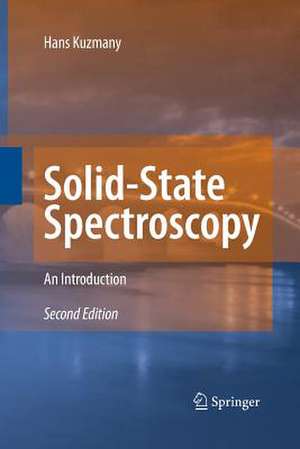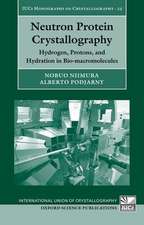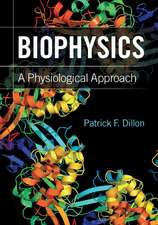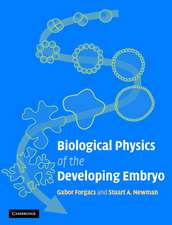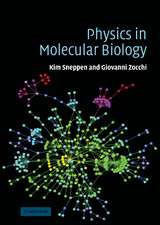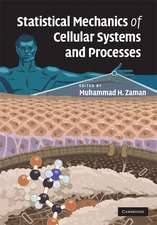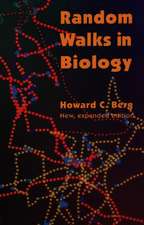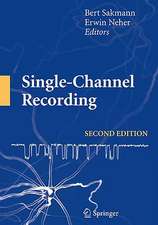Solid-State Spectroscopy: An Introduction
Autor Hans Kuzmanyen Limba Engleză Paperback – 10 oct 2014
New developments especially addressed in this second edition cover the exciting new field of mesoscopic and nanoscopic solids using light scattering from small particles, single electron (addition) spectroscopy, and quantization in magnetic fields. Likewise, the development and application of synchrotron radiation has encountered a dramatic progress particularly in the field of high resolution and angular resolved photoelectron spectroscopy.
| Toate formatele și edițiile | Preț | Express |
|---|---|---|
| Paperback (1) | 503.74 lei 6-8 săpt. | |
| Springer Berlin, Heidelberg – 10 oct 2014 | 503.74 lei 6-8 săpt. | |
| Hardback (1) | 658.88 lei 6-8 săpt. | |
| Springer Berlin, Heidelberg – 4 noi 2009 | 658.88 lei 6-8 săpt. |
Preț: 503.74 lei
Nou
Puncte Express: 756
Preț estimativ în valută:
96.42€ • 104.77$ • 81.05£
96.42€ • 104.77$ • 81.05£
Carte tipărită la comandă
Livrare economică 21 aprilie-05 mai
Preluare comenzi: 021 569.72.76
Specificații
ISBN-13: 9783642425783
ISBN-10: 364242578X
Pagini: 576
Ilustrații: XX, 554 p.
Dimensiuni: 155 x 235 x 30 mm
Greutate: 0.79 kg
Ediția:2nd ed. 2009
Editura: Springer Berlin, Heidelberg
Colecția Springer
Locul publicării:Berlin, Heidelberg, Germany
ISBN-10: 364242578X
Pagini: 576
Ilustrații: XX, 554 p.
Dimensiuni: 155 x 235 x 30 mm
Greutate: 0.79 kg
Ediția:2nd ed. 2009
Editura: Springer Berlin, Heidelberg
Colecția Springer
Locul publicării:Berlin, Heidelberg, Germany
Public țintă
GraduateCuprins
Electromagnetic Radiation.- Light Sources with General Application.- Spectral Analysis of Light.- Detection of Electromagnetic Radiation.- The Dielectric Response Functions.- Spectroscopy in the Visible and Near-Visible Spectral Range.- Symmetry and Selection Rules.- Light Scattering Spectroscopy.- Infrared Spectroscopy.- Magnetic Resonance Spectroscopy.- Ultraviolet and X-Ray Spectroscopy.- Spectroscopy with #x03B3; Rays.- Generalized Form of Response Functions.- Spectroscopy with Electrons, Positrons and Muons.- Spectroscopy of Mesoscopic and Nanoscopic Solids.- Neutron Scattering.- Spectroscopy with Atoms and Ions.- Appendix a,b,c.d.e.f.
Recenzii
From the reviews:
PHYSICALIA "The fundamental idea of introducing students to a variety of different spectroscopic techniques is excellent and the book is a potential text for a course taught at the senior level or graduate level in a physics, chemistry, or materials science program. Each chapter is followed by several problems which should prove useful for teaching purposes...The reader will find extensive and up-to-date bibliography and references, as well as several appendices."
CELLULAR & MOLECULAR BIOLOGY "This book gives an excellent overview on the most common techniques in use as well as in biophysics, in biochemistry and in cellular and molecular biology"
From the reviews of the second edition:
“This substantial book covers all the major spectroscopy techniques that are applied to materials characterisation in their solid-state. … this is a textbook probably aimed more at senior or graduate level classes … . Each chapter is also accompanied by an appendix, which provides supplemental information including derivatives of equations … and extended tables of data. … for anyone wanting a comprehensive text on spectroscopy this is certainly a good book to have on your bookshelf and a worthy second edition.” (David Bucknall, Contemporary Physics, July, 2012)
PHYSICALIA "The fundamental idea of introducing students to a variety of different spectroscopic techniques is excellent and the book is a potential text for a course taught at the senior level or graduate level in a physics, chemistry, or materials science program. Each chapter is followed by several problems which should prove useful for teaching purposes...The reader will find extensive and up-to-date bibliography and references, as well as several appendices."
CELLULAR & MOLECULAR BIOLOGY "This book gives an excellent overview on the most common techniques in use as well as in biophysics, in biochemistry and in cellular and molecular biology"
From the reviews of the second edition:
“This substantial book covers all the major spectroscopy techniques that are applied to materials characterisation in their solid-state. … this is a textbook probably aimed more at senior or graduate level classes … . Each chapter is also accompanied by an appendix, which provides supplemental information including derivatives of equations … and extended tables of data. … for anyone wanting a comprehensive text on spectroscopy this is certainly a good book to have on your bookshelf and a worthy second edition.” (David Bucknall, Contemporary Physics, July, 2012)
Textul de pe ultima copertă
Spectroscopic methods have opened up a new horizon in our knowledge of solid-state materials. Numerous techniques using electromagnetic radiation or charged and neutral particles have been invented and worked out to a high level in order to provide more detailed information on the solids. The text presented here is an updated description of such methods as they were originally presented in the first edition. It covers linear response of solids to electromagnetic radiation in a frequency range extending from megahertz or gigahertz as used in spin resonance spectroscopy, to infrared spectroscopy and various forms of spectroscopy in the visible and near visible spectral range. It extends to spectroscopy in the UV and x-ray spectral range and eventually several spectroscopic methods are addressed in the frequency range of g radiation. Likewise linear response to irradiation with particles such as electrons, positrons, muons, neutrons, and atoms is discussed. Instrumental and technical background is provided as well as application to the analysis of the solid state.
New developments especially addressed in this second edition cover the exciting new field of mesoscopic and nanoscopic solids using light scattering from small particles, single electron (addition) spectroscopy, and quantization in magnetic fields. Likewise, the development and application of synchrotron radiation has encountered a dramatic progress particularly in the field of high resolution and angular resolved photoelectron spectroscopy. Free electron lasers from undulators in linear accelerators are becoming available with dramatic enhancement in brightness and provide a fourth generation of synchrotron light sources. The better understanding and the possibilities to manipulate spin states as it happens in spintronic research stimulated sophisticated technologies in electron and nuclear spin resonance which are also covered in the new edition. Breakthrough developments were obtained in the field of light emission from semiconductor devices and for femtosecond spectroscopy. In addition in almost all other spectroscopic techniques progress was obtained in the last years and is reviewed in the text. Thus the book may be considered as a state-of-the-art introductory text in solid-state spectroscopy.
Each chapter includes problems. The concept of this textbook is designed for graduate students and young professors who want to set up lectures or courses in solid-state spectroscopy.
New developments especially addressed in this second edition cover the exciting new field of mesoscopic and nanoscopic solids using light scattering from small particles, single electron (addition) spectroscopy, and quantization in magnetic fields. Likewise, the development and application of synchrotron radiation has encountered a dramatic progress particularly in the field of high resolution and angular resolved photoelectron spectroscopy. Free electron lasers from undulators in linear accelerators are becoming available with dramatic enhancement in brightness and provide a fourth generation of synchrotron light sources. The better understanding and the possibilities to manipulate spin states as it happens in spintronic research stimulated sophisticated technologies in electron and nuclear spin resonance which are also covered in the new edition. Breakthrough developments were obtained in the field of light emission from semiconductor devices and for femtosecond spectroscopy. In addition in almost all other spectroscopic techniques progress was obtained in the last years and is reviewed in the text. Thus the book may be considered as a state-of-the-art introductory text in solid-state spectroscopy.
Each chapter includes problems. The concept of this textbook is designed for graduate students and young professors who want to set up lectures or courses in solid-state spectroscopy.
Caracteristici
Extended and revised edition which also covers synchrotron radiation, angle resolved photoemission, etc. Introductory compilation of basic concepts, methods, and applications in the field of spectroscopy Established textbook for graduate students Formulations, formulas and tables included Exercises and solutions support learning and teaching with this book Includes supplementary material: sn.pub/extras
